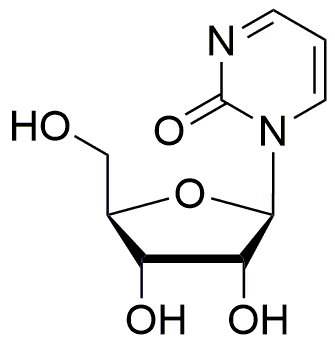Zebularine is widely utilized in research focused on:
- Cancer Research: Zebularine has shown promise as a hypomethylating agent, which can help reactivate silenced tumor suppressor genes, making it a valuable tool in developing cancer therapies.
- Epigenetics: This compound is used to study DNA methylation processes, providing insights into gene regulation and the potential for therapeutic interventions in various diseases.
- Drug Development: Researchers are exploring zebularine's ability to enhance the effectiveness of existing chemotherapeutic agents, potentially leading to more effective treatment regimens for cancer patients.
- Gene Therapy: Zebularine's role in modifying epigenetic markers makes it a candidate for gene therapy applications, particularly in conditions where gene expression needs to be altered.
- Neuroscience: Studies indicate that zebularine may influence neuronal differentiation and survival, suggesting potential applications in neurodegenerative disease research.
Informations générales
Propriétés
Sécurité et réglementation
Applications
Zebularine is widely utilized in research focused on:
- Cancer Research: Zebularine has shown promise as a hypomethylating agent, which can help reactivate silenced tumor suppressor genes, making it a valuable tool in developing cancer therapies.
- Epigenetics: This compound is used to study DNA methylation processes, providing insights into gene regulation and the potential for therapeutic interventions in various diseases.
- Drug Development: Researchers are exploring zebularine's ability to enhance the effectiveness of existing chemotherapeutic agents, potentially leading to more effective treatment regimens for cancer patients.
- Gene Therapy: Zebularine's role in modifying epigenetic markers makes it a candidate for gene therapy applications, particularly in conditions where gene expression needs to be altered.
- Neuroscience: Studies indicate that zebularine may influence neuronal differentiation and survival, suggesting potential applications in neurodegenerative disease research.
Documents
Fiches de données de sécurité (FDS)
La FDS fournit des informations de sécurité complètes sur la manipulation, le stockage et l’élimination du produit.
Spécifications du produit (PS)
Le PS fournit une description complète des propriétés du produit, notamment sa composition chimique, son état physique, sa pureté et les exigences de stockage. Il détaille également les plages de qualité acceptables et les applications prévues du produit.
Certificats d'analyse (COA)
Recherchez des certificats d'analyse (COA) en saisissant le numéro de lot du produit. Les numéros de lot et de lot se trouvent sur l'étiquette d'un produit, après les mots « Lot » ou « Lot de fabrication ».
Numéro de catalogue
Numéro de lot/série
Certificats d'origine (COO)
Ce certificat d'exploitation confirme le pays dans lequel le produit a été fabriqué, et détaille également les matériaux et composants utilisés et s'il est issu de sources naturelles, synthétiques ou autres sources spécifiques. Ce certificat peut être requis pour les douanes, le commerce et la conformité réglementaire.
Numéro de catalogue
Numéro de lot/série
Fiches de données de sécurité (FDS)
La FDS fournit des informations de sécurité complètes sur la manipulation, le stockage et l’élimination du produit.
DownloadSpécifications du produit (PS)
Le PS fournit une description complète des propriétés du produit, notamment sa composition chimique, son état physique, sa pureté et les exigences de stockage. Il détaille également les plages de qualité acceptables et les applications prévues du produit.
DownloadCertificats d'analyse (COA)
Recherchez des certificats d'analyse (COA) en saisissant le numéro de lot du produit. Les numéros de lot et de lot se trouvent sur l'étiquette d'un produit, après les mots « Lot » ou « Lot de fabrication ».
Numéro de catalogue
Numéro de lot/série
Certificats d'origine (COO)
Ce certificat d'exploitation confirme le pays dans lequel le produit a été fabriqué, et détaille également les matériaux et composants utilisés et s'il est issu de sources naturelles, synthétiques ou autres sources spécifiques. Ce certificat peut être requis pour les douanes, le commerce et la conformité réglementaire.


